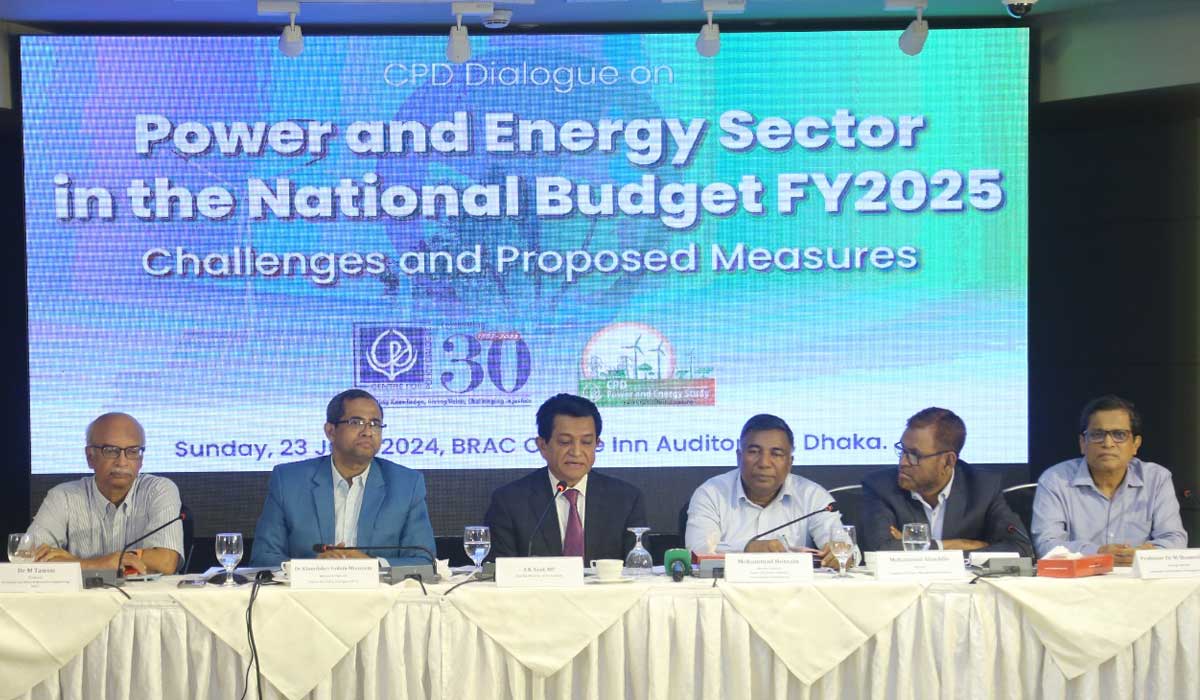
The budget for the power and energy sector failed to meet the required allocation for energy sustainability and transition in the country. It needs to be structured with a focus on these two areas. Without proper planning, allocation, implementation, and monitoring, neither energy sustainability nor transition will be achieved. While some electoral commitments are reflected in the budget, several are missing. Additionally, the budget includes measures that oppose energy transition and sustainability, such as promoting coal, setting unnecessarily ambitious power demand targets. These are some of the findings emerged from the study titled ‘Power and Energy Sector in the National Budget FY2025: Can the Proposed Measures Address the Challenges?’ conducted by the Centre for Policy Dialogue (CPD).
Based on the aforesaid grounds, CPD organised the dialogue titled ‘Power and Energy Sector in the National Budget FY2025: Challenges and Proposed Measures’ on Sunday, 23 June 2024. Dr Khondaker Golam Moazzem, Research Director, CPD, moderated the session alongside delivering the keynote presentation.
In his keynote presentation, Dr Moazzem highlighted ‘The power and energy sectors are facing challenges that require careful fiscal, budgetary, and policy planning for electricity generation, transmission, distribution, and domestic gas transmission’. He called for reducing over-generation capacity by ensuring the budget reaffirms the government’s commitment to phasing out old, outdated, and expensive fuel-based plants when their contractual periods end.
To reduce load-shedding, he emphasised that the budget should enhance allocations for drilling more gas wells to reach the set targets. Increasing domestic gas production is crucial for meeting energy demands and reducing dependency on external sources.
The Research Director also called for expediting renewable energy projects. Public investment in renewable energy-based generation and transmission, including the development of a smart grid system, requires urgent attention. This will ensure a sustainable and modern energy infrastructure.
Reducing energy import dependency was another key point. Dr Moazzem highlighted that the target of drilling 48 wells by 2025 will not be achievable unless the priority shifts from Liquefied Natural Gas (LNG) import to domestic gas exploration. More gas well workover projects should be undertaken to meet the daily gas requirement of 2,000 mmcf/d with local gas. Relying heavily on imported LNG could increase Bangladesh’s vulnerability to global price fluctuations and political issues between countries.
Regarding the implementation of the transmission and distribution (T&D) system, he stressed the need for targeted allocation to complete T&D-related projects and develop a smart grid system.
Addressing the continuous financial vulnerability of public authorities in FY2024 was also a critical issue. He urged the government to prioritise improving the financial position of the Bangladesh Power Development Board (BPDB) while gradually reducing the debt-equity ratio of other public authorities to healthy levels. BPDB should focus on reducing capacity payments through structural reforms, reallocating funds towards the T&D system to improve infrastructure and debt-equity ratios and transitioning towards renewable and financially sustainable power plants.
He called for a strategic budgetary allocation for energy transition. The non-climate change relevant budget, 92.42 per cent in FY2025, should not be used to promote fossil fuel-based power production. Instead, a portion of that budget should be allocated for phasing out fossil fuel-based power plants. Increasing the percentage of the total budget allocated for this purpose is crucial to breaking the carbon lock-in in the power division.
Mr A K Azad, MP, Hon’ble Member of Parliament, pointed out ‘Bangladesh imports LNG, which constitutes 20 to 25 per cent of the supply, and blend the rest with our own gas. This blending has been cited as a factor contributing to the perceived increase in gas prices. Our main focus is not on the required adjustments. However, senior government officials convened when gas prices nearly doubled, ensuring uninterrupted supply of gas and electricity. As a result, we chose uninterrupted gas over diesel, yet we still experience seven to eight hours of load shedding, necessitating the use of diesel’.
While discussing about solar energy, Mr Mohammad Hossain, Director General, Power Cell, Power Division, Government of Bangladesh, highlighted ‘We are already conducting feasibility studies at Matarbari to identify more areas suitable for solar energy development’. He also clarified that the price of fuel is not decreasing in Bangladesh despite a drop in the global market due to the exchange rate. The increased value of the dollar causes fuel to be purchased at a higher price.
Dr M Tamim, Professor, Petroleum and Mineral Resources Engineering, BUET and Former Special Assistant to the Chief Advisor opined ‘Energy policies are currently being prepared based on planning, but the planning should have been done based on firm energy policies.’ He noted that all the plans prepared so far, such as the Power System Master Plan (PSMP) 2005, have underperformed because they lacked clear policies to support them. He emphasised that policy decisions should have included selecting a strong regulator for this sector.
‘We cannot rely solely on solar energy for the renewable energy transition; we need to broaden our focus to include wind power’ recommended the Rector of Bangladesh Power Management Institute, Mr Mohammad Alauddin. He added that data on wind power generation needs to be collected for at least two years, after which the private sector can be equipped with this data to help generate electricity through wind power.
Professor Dr M Shamsul Alam, Energy Advisor, Consumers Association of Bangladesh (CAB) remarked ‘The government has been overlooking how other countries have successfully achieved renewable energy transitions through effective policy application. Taking lessons from these countries can significantly benefit Bangladesh’.
High-level policymakers, political leaders, academics, development practitioners, civil society activists, and journalists attended the dialogue and shared their valuable insights.


